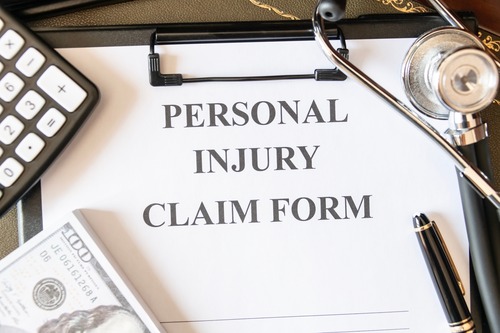After an accident, one of the first people you hear from is the insurance adjuster. Their job is to review your claim, but their goal is to protect the insurance company’s money. If you’ve suffered an injury, it’s important to understand how insurance adjusters work, what tactics they use, and why having a personal injury attorney can protect your claim.
In this blog, we explain how insurance adjusters handle personal injury claims, the tactics they use to reduce payouts, and how working with an experienced Raleigh personal injury attorney like Mogy Law can help you protect your rights and pursue fair compensation.
What Is an Insurance Adjuster?
Understanding the role of an insurance adjuster is the first step in handling a personal injury claim. This section explains who they are, what they do, and how they affect your insurance claim.
Staff, Independent, and Public Adjusters
There are three main types of insurance adjusters. Staff adjusters work directly for the insurance company and handle claims from their own policyholders. Independent adjusters are hired through third-party firms when extra help is needed. Public adjusters work for policyholders, not insurance companies, and usually deal with property claims. In personal injury cases, you will mostly deal with staff or independent adjusters.
What Insurance Adjusters Do
Insurance adjusters review claims and decide what the insurance company should pay. They examine the policy, check accident reports, inspect damages, and speak to witnesses. They also estimate repair costs and review medical records. Their goal is to complete the claims process and recommend a settlement based on their findings.
Who Insurance Adjusters Represent
Adjusters work for the insurance company. Their job is to protect the company’s financial interest. Even independent adjusters are paid by the insurer. This means they are not neutral. They are trained to reduce claim payments by questioning damages and using strict evaluation methods.
Licensing Requirements in North Carolina
North Carolina law requires adjusters to be licensed. Under NC Gen Stat § 58-33-26, they must pass a licensing exam and complete regular continuing education. Most start with a high school diploma and learn through training. Ongoing education helps them stay current with laws and industry standards.
Why the Adjuster’s Role Matters
The adjuster’s decisions affect how much you may receive in a settlement. They control much of the process and work to save the company money. If you are injured, a personal injury attorney can deal with the adjuster and help make sure your claim is handled fairly.
The Insurance Adjuster’s Role in the Personal Injury Claims Process
Insurance adjusters manage every stage of the personal injury claims process, from the first call to the final payment decision.
First Contact With the Claimant
After a personal injury claim is filed, an insurance adjuster will contact the injured person. This usually happens within a few days of the accident. The adjuster may ask for a recorded statement, medical records, or details about the incident. Their goal is to gather information early and start building a file for the insurance company.
Reviewing the Insurance Policy
The adjuster begins by reviewing the insurance policy to check what is covered. They look at liability limits, exclusions, and any special conditions. This step helps the insurance company decide how much it may be responsible for. If the injury falls outside the policy terms, the claim may be denied or reduced.
Investigating the Claim
The claims investigation involves collecting evidence. The adjuster may speak to witnesses, review police reports, and request medical documentation. In some cases, they will visit the accident scene or inspect property damage. This part of the process helps the adjuster decide the extent of the insurance company’s liability.
Evaluating Damages and Injury
Once the investigation is complete, the adjuster assesses the value of the claim. They review medical bills, lost wage reports, and repair estimates. Many adjusters use software to estimate injury costs based on similar claims. Their objective is to assign a dollar value to the damages supported by the evidence.
Making a Settlement Offer
After reviewing all information, the adjuster makes a settlement offer. This amount is often lower than what the claimant may expect. Most insurance claims adjusters are trained to limit payments and close claims quickly. If the offer is rejected, the claimant may need to provide additional information or demand a higher amount with the help of a personal injury attorney.
Closing the Claim
If a settlement is accepted, the claim is closed and payment is issued. If not, negotiations may continue or legal action may begin. Throughout the process, the adjuster controls much of the timing and flow of communication. Their actions can speed up or delay the claim depending on the situation.
Common Tactics Used by Insurance Adjusters
Insurance adjusters use several tactics to limit how much the insurance company pays on a personal injury claim.
Offering Quick Settlements
Adjusters often offer fast settlements before the full cost of the injury is clear. This is done to close the claim early and avoid larger payments later. These offers may seem helpful but are usually far below the actual value of the claim. Accepting them can prevent claimants from recovering future costs like ongoing medical care or lost income.
Delaying Communication
Delays are a common tactic in the claims process. Adjusters may take days or weeks to return calls, respond to emails, or send updates. This creates pressure and frustration for the injured party. The goal is to push the claimant into accepting a lower offer just to end the process.
Requesting Excessive Documentation
Some adjusters ask for large amounts of paperwork that go beyond what is needed. They may request repeated medical records, employment history, or unrelated documents. This slows down the claim and gives the insurance company more time to find ways to challenge the claim.
Misinterpreting Policy Terms
Adjusters may misstate what the insurance policy covers. They might claim that certain treatments or damages are excluded, even when they are not. Without a full understanding of the insurance policy, claimants may accept this without question and lose compensation they are owed.
Using Recorded Statements Against You
An adjuster may ask for a recorded statement early in the claims process. What seems like a routine request can be used to find small inconsistencies or comments that reduce the value of the claim. These statements are reviewed closely and can hurt the case later, especially if taken without legal advice.
How a Personal Injury Attorney Protects You from Insurance Company Tactics
Insurance adjusters are trained to protect the company’s money, not your recovery. A personal injury attorney works to make sure you are treated fairly throughout the claims process.
Preventing Low Settlement Offers
Adjusters often offer less than a claim is worth. A personal injury attorney reviews the full extent of your damages, including medical bills, lost wages, and pain. They calculate a proper value and push back against low offers. Mogy Law has experience handling serious injury claims in Raleigh and knows how to demand fair compensation from insurance companies.
Controlling Communication With the Adjuster
Once you hire an attorney, the insurance adjuster cannot contact you directly. This protects you from pressure, manipulation, or misleading questions. Mogy Law handles all communication, ensuring the insurance company follows the rules and does not delay or misrepresent the claim.
Challenging Unfair Policy Interpretations
Adjusters may claim your insurance policy does not cover certain treatments or costs. A personal injury lawyer can review the insurance policy and challenge false or misleading interpretations. The team at Mogy Law understands how to read policy language and apply North Carolina law to protect your rights.
Gathering Strong Evidence
Insurance companies rely on evidence to reduce claims. Your lawyer works to gather medical records, witness statements, expert opinions, and accident reports that support your case. Mogy Law builds strong files that help prove fault and support full compensation.
Preparing for Legal Action
If the insurance company refuses to pay a fair amount, your attorney can file a lawsuit. The threat of court action often leads to better settlement offers. Mogy Law has experience taking cases to trial when needed. Their team prepares each case as if it may go to court, which increases the pressure on the insurance company to settle fairly.
Contact an Experienced Raleigh Personal Injury Attorney Today!
If you’ve been injured in an accident and are dealing with pressure from an insurance adjuster, it’s important to protect your rights from the start. At Mogy Law, our team understands how insurance companies operate and knows the tactics they use to limit what they pay. We take over communication with the adjuster, build a strong case, and fight for the full compensation you deserve.
Contact us at (901) 443-9133 for a free case consultation today!








